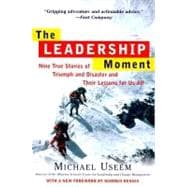
Note: Supplemental materials are not guaranteed with Rental or Used book purchases.
Purchase Benefits
What is included with this book?
| Introduction: The Leadership Moment | p. 3 |
| Roy Vagelos Attacks River Blindness | p. 10 |
| Wagner Dodge Retreats in Mann Gulch | p. 43 |
| Eugene Kranz Returns Apollo 13 to Earth | p. 65 |
| Arlene Blum Ascends Annapurna | p. 94 |
| Joshua Lawrence Chamberlain Defends | p. 127 |
| Clifton Wharton Restructures TIAA-CREF | p. 153 |
| John Gutfreund Loses Salomon Inc. | p. 178 |
| Nancy Barry Builds Women's World Banking | p. 208 |
| Alfredo Cristiani Ends El Salvador's Civil War | p. 234 |
| Conclusion: Vision plus Action | p. 263 |
| A Leader's Guide | p. 273 |
| Notes | p. 283 |
| Sources | p. 289 |
| Acknowledgments | p. 303 |
| Index | p. 307 |
| Photographs | p. 329 |
| Table of Contents provided by Blackwell. All Rights Reserved. |
The New copy of this book will include any supplemental materials advertised. Please check the title of the book to determine if it should include any access cards, study guides, lab manuals, CDs, etc.
The Used, Rental and eBook copies of this book are not guaranteed to include any supplemental materials. Typically, only the book itself is included. This is true even if the title states it includes any access cards, study guides, lab manuals, CDs, etc.
Excerpted from The Leadership Moment: Nine True Stories of Triumph and Disaster and Their Lessons for Us All by Michael Useem
All rights reserved by the original copyright owners. Excerpts are provided for display purposes only and may not be reproduced, reprinted or distributed without the written permission of the publisher.